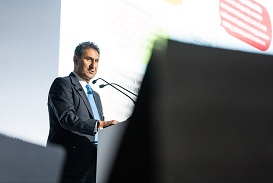BY MEKONNEN TESHOME – Socio and geopolitical instability, challenges related to supply chain disruptions and unbalanced energy affordability as well as environmental challenges hindering the global clean energy transition in general and that of Africa in particular, the International Renewable Energy Agency (IRENA) said.
Director-General of IRENA, the global clean energy driver, Mr. Francesco La Camera, while addressing the 15th assembly of the agency today, January 12, 2025, in Abu Dhabi, UAE, said that the global clean energy effort requires a multifaceted approach, addressing challenges such as geopolitical instability, supply chain disruptions, and the need to balance energy affordability with environmental sustainability.
“The next five years will be decisive. We have a joint responsibility to find solutions to these challenges and IRENA remains your committed partner and supporter in accelerating the renewables-based energy transition,” the General Director underscores.
The newly elected of the IRENA general assembly, Bojan Kumer, Slovenia’s Minister of the Environment, Climate and Energy indicated : “No country, regardless of its size, can achieve this transition alone. The energy transition is a shared responsibility, requiring unity and collective action.”
Mr. Kumer has expressed his country’s conviction and commitment that it firmly believes in the potential for collaboration, as we all face common challenges in achieving a just, inclusive, and competitive energy future and enhancing climate ambition.
Dr. Amna Al Dahak, Minister of Climate Change and Environment of the UAE, IRENA’s host country, on her part pointed out that the UAE has proudly hosted IRENA for 15 years, providing a global platform for the critical dialogues and collaborations needed to drive the energy transition forward at pace and scale.
The 15th IRENA General Assembly is an opportunity to demonstrate the power of international cooperation in shaping a sustainable and resilient future, with the UAE remaining a steadfast partner and catalyst for global energy security and sustainability, she added.
Africa Lags Behind Global Clean Energy Target
According to IRENA General-director Mr. Camera, the geographical distribution of renewable power capacity remains strikingly unbalanced that Asia, Europe and North America accounted for almost 85% of global installed capacity, adding that : “While Africa possesses immense renewable energy potential and grapples with substantial energy needs, yet, the region’s contribution to global installed renewable power capacity remains a mere 1.6%.”
IRENA’s “Geopolitics of the energy transition: Energy security” – 2024, states that, in recent years, energy security has surged in prominence, largely due to the volatility of fossil fuel markets, the ripple effects of the COVID-19 pandemic and the competitiveness of renewable energy.
“In addition, events such as the attacks on the Nordstream pipelines in the Baltic Sea and disruptions in the supply of oil and liquefied natural gas through the Red Sea underline the links between energy security and military matters. This new environment has heightened concerns about foreign dependency and altered partnerships and alliances. Second, the global energy transition is accelerating.”
Installed Global Renewable Growing, But Geopolitically Affected
In 2023 alone, some 473 gigawatts (GW) of new renewable power were installed, bringing the global total to almost 4 000 GW, however, it says that at the same time, policy making is becoming more complex, blending energy strategies with the imperative of a just transition and wider socioeconomic effects.
It is also noteworthy that renewable energy deployment patterns are persistently concentrated in a few regions and around a limited range of technologies. These patterns are accompanied by two trajectories: growing inequality and insufficient systemic investment in infrastructure, policy, institutions and people, IRENA has highlighted.
Climate Change – Another Menace In Energy Transition
The report also states that the physical effects of climate change on energy systems and supply chains are increasing year by year.
“They are already affecting supply, distribution and demand for energy. Despite political pressure to stay on the 1.5°C trajectory, trends clearly show the energy transition to be off track. This makes climate change all the more relevant to discussions on energy security as it is emerging as a new layer of risk,” it underlines.
The two-day 15th IRENA Assembly has brought together ministers and high-level delegates from IRENA’s 170 Member States, academia, development banks, CEOs and youth to enhance wider, cross-sectoral collaboration on the energy transition. It has also kicked-start the 2025 edition of “Abu Dhabi Sustainability Week (ADSW)” , taking place from January 12-18 in Abu Dhabi.

